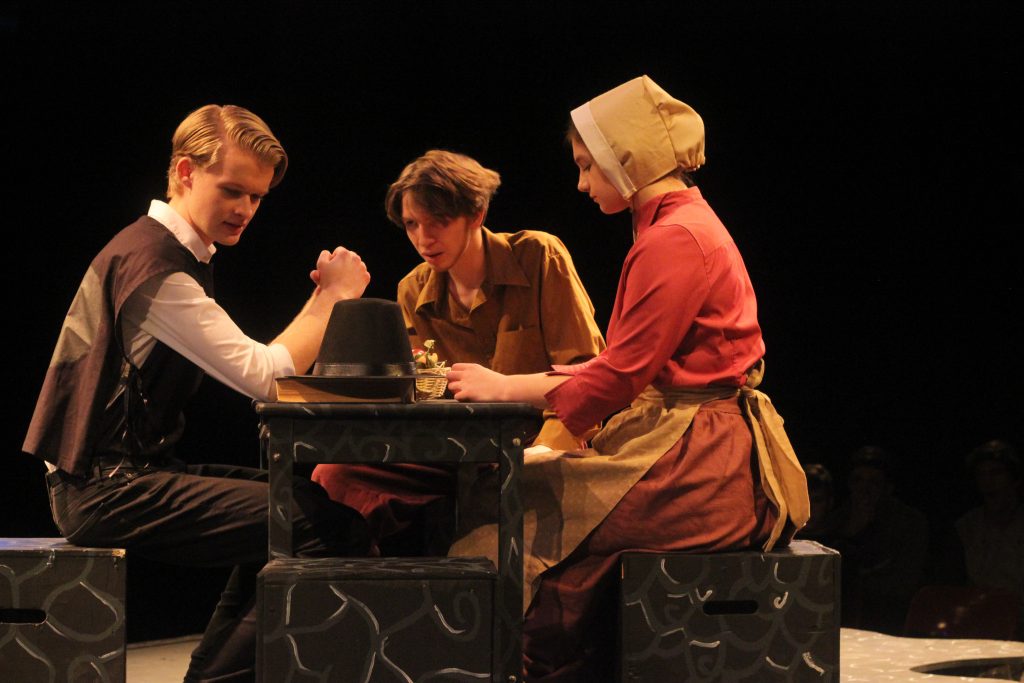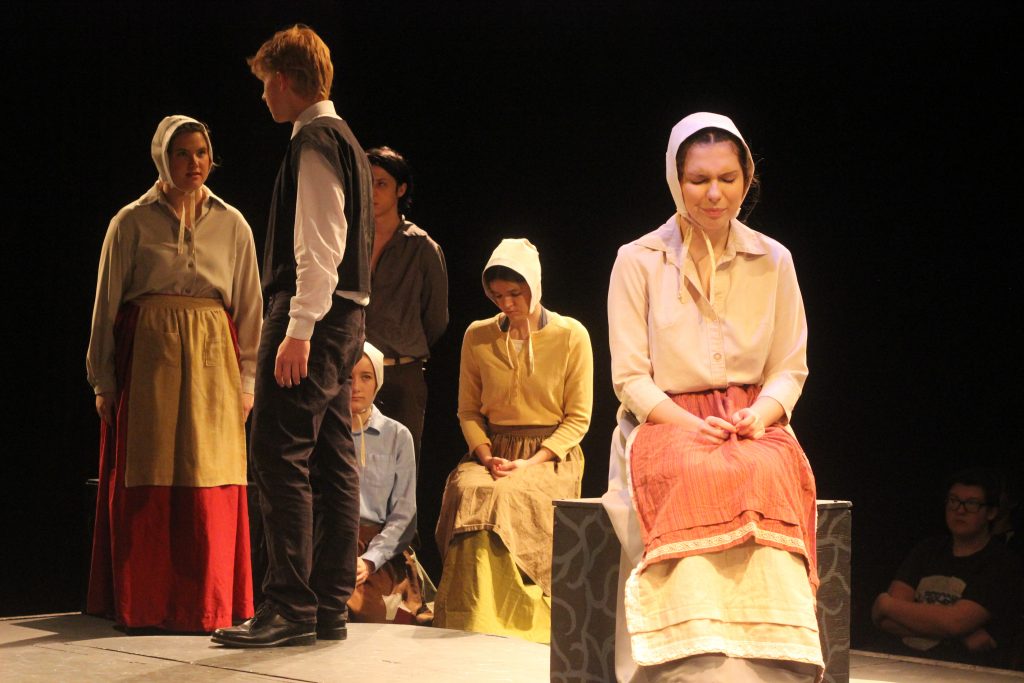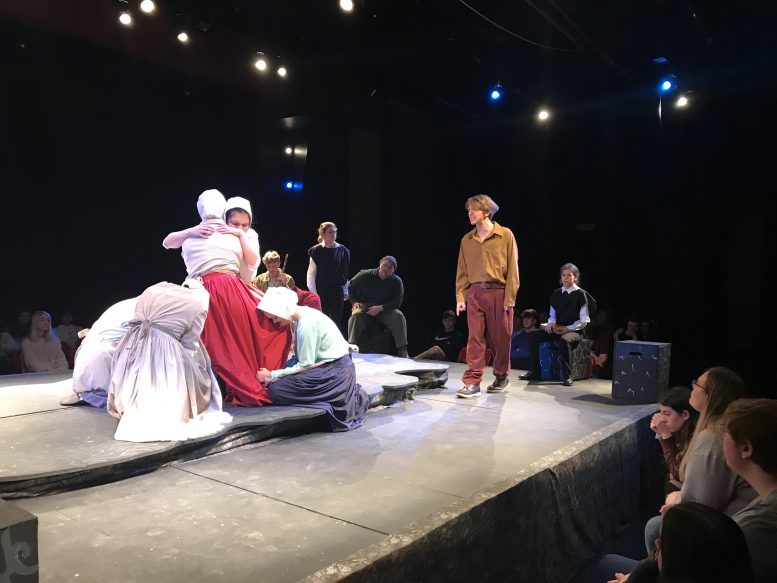By DAVID DUPONT
BG Independent News
“The Crucible” by Arthur Miller is a time-tested masterpiece. It was a classic back when I was in high school, even though it was not yet 20 years old. The production by the Bowling Green High School drama club shows why it is so revered.
“The Crucible,” directed by Jo Beth Gonzalez, will be staged at the Bowling Green Performing Arts Center Thursday, Oct. 31 and Saturday Nov. 2 at 7 p.m. and Sunday, Nov. 3 at 2 p.m.

Miller’s 1953 drama, inspired by the Salem Witch Trials, has enduring themes about mass hysteria, mob mentality, and misuse of power. Written in response to McCarthyism when Miller himself refused to name names, the message has remained sadly relevant throughout the intervening years. Even those in control as the hysteria builds seem trapped. The human dilemma of people accused — and everyone is in danger of being accused — is central.
The play is presented in the round with the audience on all sides of the actors, who perform on a raised platform.
The proximity to the action implicates the audience in the unfolding tragedy as more and more people are arrested on suspicion of witchcraft.

The play opens with a stylized reenactment of the village girls dancing in the woods the night before. Now one of their number Betty Parris (Kiki Schempf) is prone in her bed, comatose, except for an occasional outburst. Betty is the daughter of the minister Samuel Parris (Cole Nemeth).
He is concerned about his daughter’s condition, but more concerned about talk that witchcraft is involved. That could cost him his job. Though the respected local woman Rebecca Nurse (Maddy Depinet) urges him to summon a doctor, he instead has called Rev. John Hale (Ethan Brown), a noted authority on witchcraft.
Betty’s room is a busy place with various members of the community moving in and out, both curious about the girl’s condition, and airing various grievances.
There are disputes about land between the wealthy Thomas Putnam (Hailey Kozy) and Giles Corey (Cody Ray). Putnam’s wife Ann (Sophi Hachtel) believes that her multiple stillbirths are the result of sorcery. Rev. Parris and John Proctor (Dylan Perez) are at odds over the minister’s compensation and Proctor’s lack of piety.
Proctor complains Parris only preaches about fire and brimstone, and that he is demanding compensation other ministers have not.
Also visiting the room are the other girls in the community, including Parris’ niece Abigail Williams (Allison Nonnemaker). Parris had seen them dancing naked the night before in the woods, and he fears sorcery is abroad.
Abigail insists this was all innocent fun. Then when alone with her peers she threatens them to keep quiet. They had in reality been trying to conjure a curse against Proctor’s wife Elizabeth (Anne Weaver) with the help of the Tituba (Isa Herrera), a slave from the Bahamas. To resort to such sorcery would mean hanging.
While Williams was a servant of the Proctors, she had a dalliance with John, and when they were discovered Elizabeth dismissed her.
She believes John still desires her and is eager to dance on Elizabeth’s grave so she can be reunited with him. John denies this in not a wholly convincing way.
Into this colonial Peyton Place, Hale arrives toting an armful of books on all manner of satanic creatures, convinced he will expel whatever is possessing Betty.
But these are times when fears of witchcraft afflict the Massachusetts Bay colony, not just Salem. Fueled by fear and ill-will, more and more people become ensnared by the girls’ lies.

First it is a dozen and then more than 30, and then so many that the cows wander aimlessly on the road because those who should be tending them are in the village’s jail.
The Proctors are among them. Hale for his part starts to suspect that all this has gone too far and that he is an accomplice in an evil that has nothing to do with Satan, but rather the inclinations of men.
But those who have come to Salem to prosecute the case — Deputy Governor Danforth (Isaac Douglass), Judge Hathorne (Emma Matney) and Ezekiel Cheever (Lauren Clifford) — will entertain no such doubts. How can they go back now when Danforth has authorized the imprisonment of 400 in the colony and the hanging of 72? Indeed expressing doubt becomes reason for arrest. Those executions don’t include Corey who dies while being crushed by a stone to elicit a confession. Yet by not confessing he has assured his land will pass on to his sons. Confessions, no matter how forced, can spare a person’s life.
So the accused face the choice: confess, and give up the names of others, and live or refuse and die on the gallows. That’s the choice Mary Warren (Terra Sloane), the Proctors’ servant faces.
This falls heavily on John Proctor, who evolves as the play progresses from being unsympathetic to being something very like a hero, committed to protecting his wife. Perez makes his torment vividly palpable.
The acting is across the board is stellar. Each actor, even those in the chorus of bewitched girls, inhabits their individual part. They also project a sense of community.
That’s not surprising when you consider how often these actors have appeared together in both high school and Horizon Youth Theatre shows.
All that shared theatrical history is evident in “The Crucible” and contributes to an engrossing and thought-provoking production that does justice to this classic script.

